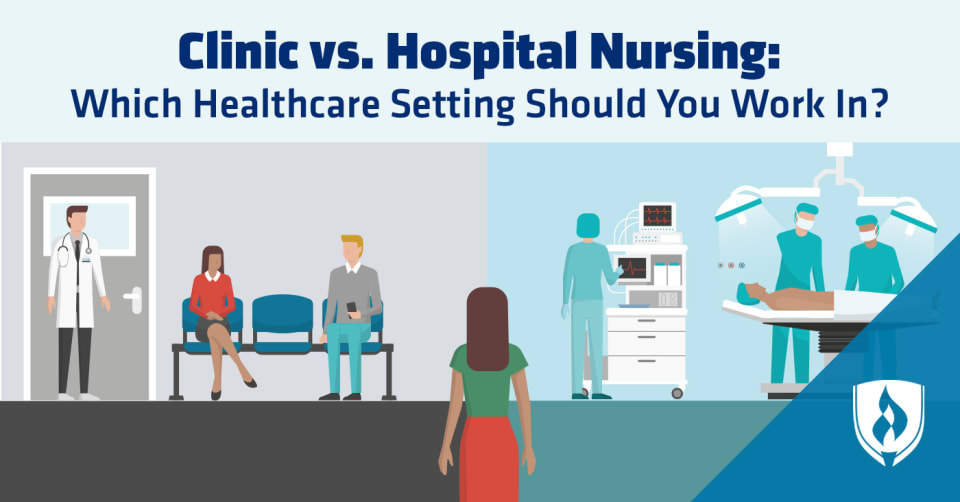
Rushing into a new career without doing your research can be a big mistake, which is why you took your time and carefully narrowed down your options. All the signs pointed in one direction for you: nursing. Now you’re proudly telling anyone who will listen that you’re going to be a nurse.
The decisions don’t stop there, however. Nurses face many choices when it comes to their careers. Determining where to work as a nurse is one decision that can have a substantial impact on your nursing career. Are you better off working in a hospital environment or at a smaller clinic?
We can’t make the decision for you, but we can give you expert insights from nurses who have worked in both hospitals and clinics. Use this behind-the-scenes peek into nursing in clinics and hospitals to weigh your options and find a satisfying work environment.
Get Your Nursing School Questions Answered at a Nursing Information Session
Clinic vs. hospital nursing: Common roles
Both clinics and hospitals offer opportunities for nurses to specialize in areas of care that interest them. On the clinic side, nurses can choose to see a variety of patients in a general family care clinic, or they can develop a specialty by working in a healthcare facility that focuses a particular type of care, such as dermatology, gynecology, mental health or pediatrics.
These are just a few job titles available to clinic nurses:
- Registered nurse (RN)
- Nursing assistant
- Licensed practical nurse (LPN)
- Nurse practitioner
- Nurse case manager
- Lead clinic nurse
- Clinical nurse specialist
- Pediatric nurse
Hospital nurses also enjoy plenty of positions to choose from. Thanks to the variety of departments and the number of patients hospitals care for, nurses are needed to fill specialty roles, patient care positions and management jobs.
Take a look at these hospital job titles to get an idea of the opportunities you may find:
- Operating room nurse
- Labor and delivery nurse
- NICU nurse
- Cardiovascular nurse
- Emergency nurse
- Nurse anesthetist
- Telemetry nurse
- Critical care nurse
Hospitals and clinics both allow opportunities for advancement as you move forward in your nursing career. A hospital nurse could become a charge nurse or a patient care director. Clinic nurses can advance to lead clinic nurse or other nurse management positions.
Clinic vs. hospital nursing: Job duties
Nurses’ job duties vary depending on their specific job title and workplace, but there are some general differences between hospital and clinic work.
“In the clinic, the RN is usually responsible for only one patient at a time and provides routine preventative care,” says veteran nurse Shanna Shafer. She adds that clinic job duties typically include administering injections, conducting basic assessments and assisting with low-risk procedures.
Clinic nurses also have the opportunity to develop strong professional relationships with providers. However, they may not have time to develop the same rapport with patients. “In the clinic, most interactions with patients are very minimal. On average I’ll spend 30 minutes with one patient at a time,” says Thomas N. Uzuegbunem, an RN with experience in both outpatient clinics and hospitals as well as the owner of Nurse Money Talk.
On the other hand, the hospital setting allows nurses to care for the same patient for an extended time, often the entirety of their shift. However, hospital nurses must balance this with their responsibilities to other patients. “In the hospital, an RN is responsible for several patients at the same time,” Shafer says. She cautions that on a busy shift, nurses may become overwhelmed with the number of patients they have to care for.
Hospital nursing is also more unpredictable than the routine days of a clinic RN. Shafer notes that a hospital nurse’s day doesn’t follow a set schedule. Instead, a nurse must take whatever pace is necessary to meet patient outcomes. This could be recovering a patient from anesthesia, admitting and discharging patients, performing dressing changes and treatments and continually monitoring and adjusting to each patient's changing status, according to Shafer.
Clinic vs. hospital nursing: Work schedules
Hospital nursing is known for offering a flexible schedule with irregular hours, which could be a pro or a con depending on your personal preference. “In the hospital setting, you have more days off during the week. There are ample opportunities to work a 12- or 16-hour workday,” Uzuegbunem says.
There’s also the potential to work overnights and holidays. This schedule allows for hospital nurses to run errands during the day, spend full days at home with family or even take more vacations by stacking their work days in a row.
Despite these advantages, irregular schedules aren’t for everyone. If a consistent schedule during typical work hours is more appealing to you, clinic nursing could be a better fit. Clinic nurses typically enjoy a regular Monday through Friday, nine-to-five work schedule. There may be some variation depending on the clinic or role, but generally speaking, a clinic nurse keeps a more traditional work schedule.
A clinic nurse’s schedule during the work day can also be more predictable. “There is time to sit between patients, a scheduled lunch break and a flow to the day that, although it can be interrupted by unexpected events, is usually consistent over weeks and months,” Shafer says. This isn’t always true of hospitals, where urgent events and emergencies are more likely to occur and interrupt the day’s schedule.
Nursing skills and education needed in clinics vs. hospitals
Both clinic and hospital nursing positions will require nurses to be trained in a relevant nursing program, whether it’s becoming a licensed practical nurse (LPN) or earning an ASN, BSN, or MSN degree to become a registered nurse (RN).
Though both work settings hire nurses at all education levels, some workplaces might prefer certain degrees over others. “LPNs and Associate’s-prepared RNs can still find ample positions in clinics, whereas most hospitals prefer to hire RNs with a Bachelor's degree,” Shafer says. This is because clinic nurses typically work under the supervision of a physician or nurse practitioner, while hospital nurses are often more independent in caring for patients.
No matter what level of education you choose, certain qualities and characteristics can make you a better fit for either clinic or hospital work. Hospital nurses should be able to keep up in a fast-paced environment, keep their cool in tense situations and be able to handle the physical demands of lifting and assisting patients. Clinic nurses should be comfortable working closely with others on a healthcare team, educating patients and performing routine job duties without getting bored.
Clinic vs. hospital: the choice is yours
So what wins the clinic versus hospital nursing debate? Only you can decide. Now that you’ve heard from real-life nurses about what it’s like to work in hospitals and clinics, you’re probably itching to earn your degree and begin your nursing career.
Learn more about getting started with your nursing education with our article, “How Long Is Nursing School? Your Timeline to Becoming a Nurse.”




